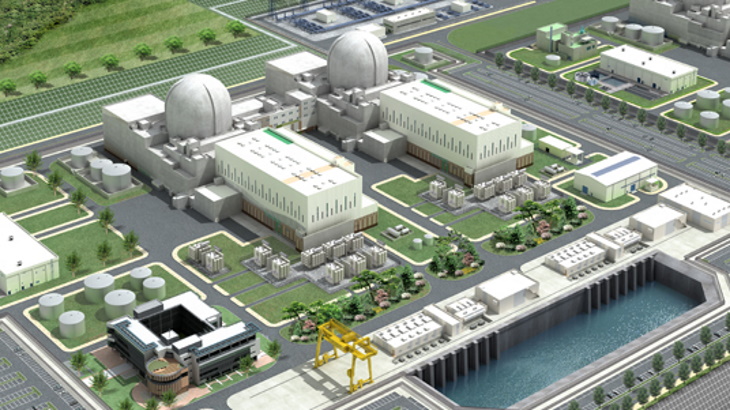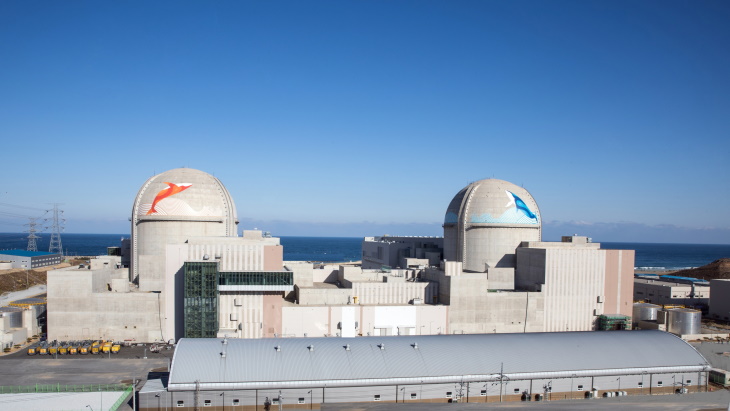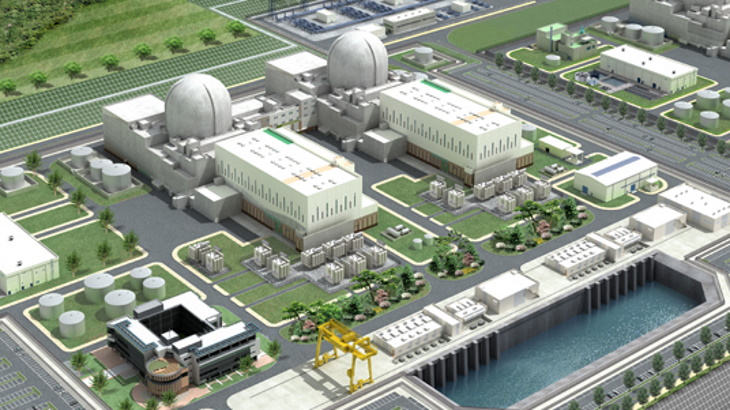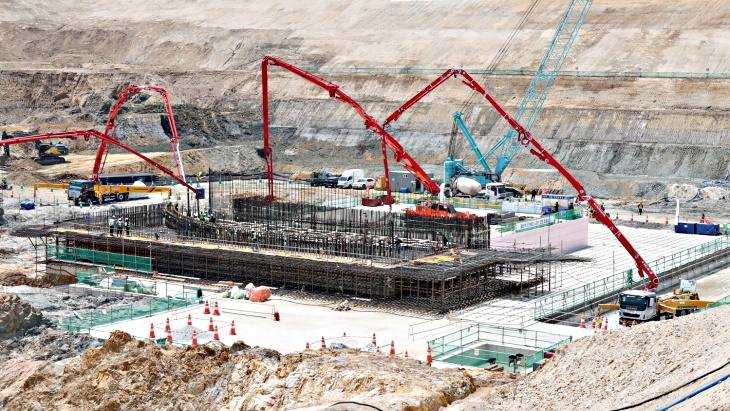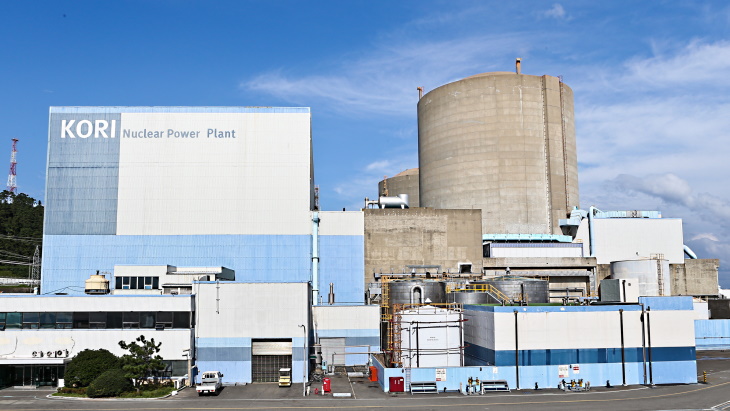https://www.world-nuclear-news.org/Arti ... nsion-of-nDraft Korean energy policy reflects expansion of nuclear
01 September 2022
South Korea's Ministry of Trade, Industry and Energy (MOTIE) has released a draft long-term energy plan looking 15 years ahead. Under the plan, the proportion of nuclear power will grow to almost one-third of the country's total energy mix by 2030 in a move aimed at boosting energy security and meeting climate goals.
South Korea's President Yoon Suk-yeol, elected in May, has vowed to reverse former President Moon Jae-in's policy of phasing out nuclear power, a policy which was brought in after he assumed office in 2017, and followed the 2011 Fukushima Daiichi accident in Japan.
In July, the government laid out a new energy policy which aims to maintain nuclear's share of the country's energy mix at a minimum of 30% by 2030. It also calls for the construction of units 3 and 4 at the Shin Hanul nuclear power plant to resume after design work was suspended in 2017 due to uncertainties about government policy on the construction of new reactors. The new policy also aims to strengthen exports of new energy industries and "capitalise on them as growth engines". It sets the goal of exporting 10 nuclear power plants by 2030, as well as the development of a Korean small modular reactor design.
On 30 August, MOTIE's General Subcommittee - an advisory body comprising 113 experts and stakeholders - released a working-level draft of the 10th Basic Plan for Electricity Supply and Demand. This is a mid- to long-term (15-year) plan that predicts electric power demand and designs electric power facilities and power supply configuration accordingly to stabilise electric power supply and demand.
According to the draft plan, electricity demand in 2036 is expected to reach a maximum of 117.3 GW. The plan calls for some 143.1 GW of generating capacity to be in place by then. MOTIE said the 22% difference between demand and capacity takes into consideration maintenance outages, breakdowns, demand fluctuations and construction delays.
The plan calls for 201.7 TWh of electricity to be generated with nuclear power by 2030, which will account for 32.8% of the country's total generation. The previous version of the mid-term plan, released in October 2021, put nuclear's share at 25% in 2030. The actual figure for 2021 was 27.4%, according to MOTIE.
This increase in nuclear's share reflects the start up of six new reactors between now and 2033 (Shin Hanul units 1-4 and Shin Kori units 5 and 6) as well as the continued operation of 12 existing reactors. Nuclear generating capacity is expected to increase from 24.7 GW in 2022 to 28.9 GW in 2030 and to 31.7 GW in 2036.
According to the plan, renewable energy will account for 21.5% of South Korea's total electricity generation by 2030, down by 8.7 percentage points from the previous goal. Coal will account for 21.2% and liquefied natural gas 20.9%.
The energy plan will be finalised by the end of this year after due environmental assessment, public hearings and consultations with ministries concerned, MOTIE said.
Revitalising the industry
On 10 August, MOTIE signed a Memorandum of Understanding (MoU) with Korea Hydro & Nuclear Power (KHNP), Doosan Enerbility and nuclear energy equipment and materials manufacturers with the aim of revitalising the South Korea's nuclear industry. The MoU aims to improve the competitiveness of the nuclear industry ecosystem through shared growth, working together to contribute to carbon neutrality, responding to the energy crisis and stabilisation of power supply.
KHNP's newly-appointed CEO Joo-ho Whang has said reinvigorating the energy industry will be his top priority.
"We will export 10 nuclear power plants," he said during his inaugural address held at the KHNP headquarters in Gyeongju, North Gyeongsang Province, on 22 August, The Korea Times reported. "We will write a new history, a goal we can achieve with potential and pride as a global nuclear powerhouse that began without any technology or capital. I hereby ask for the full commitment of the 12,000 KHNP employees."
Last week, KHNP was awarded a contract by Rosatom subsidiary Atomstroyexport for the construction of some 80 buildings and structures at the four units of Egypt's first nuclear power plant at El Dabaa, as well as procuring and supplying equipment and materials for the turbine islands.
Le nucléaire Sud-Coréen
Modérateurs : Rod, Modérateurs
- energy_isere
- Modérateur

- Messages : 102799
- Inscription : 24 avr. 2005, 21:26
- Localisation : Les JO de 68, c'était la
- Contact :
Re: Le nucléaire Sud-Coréen
Go nuclear en Corée du Sud avec le nouveau président.
- energy_isere
- Modérateur

- Messages : 102799
- Inscription : 24 avr. 2005, 21:26
- Localisation : Les JO de 68, c'était la
- Contact :
Re: Le nucléaire Sud-Coréen
https://www.world-nuclear-news.org/Arti ... ory-beginsExpansion of South Korean waste repository begins
31 August 2022
A groundbreaking ceremony has been held to mark the start of construction of the second phase near-surface disposal facilities for low- and intermediate-level radioactive waste at Gyeongju in South Korea's North Gyeongsang province.
..........................
- energy_isere
- Modérateur

- Messages : 102799
- Inscription : 24 avr. 2005, 21:26
- Localisation : Les JO de 68, c'était la
- Contact :
Re: Le nucléaire Sud-Coréen
https://www.world-nuclear-news.org/Arti ... ear-plantsSouth Korea considering new nuclear plants
12 July 2023
South Korea's Ministry of Industry is to review the need for new nuclear power plants to expand the country's power supply to meet predicted increased demand for electricity.
The announcement came from the 29th Energy Committee meeting, which Trade Minister Lee Chang-yang was presiding over.
According to South Korea's Ministry of Trade, Industry and Energy (MOTIE), the committee noted "recent mid- to long-term changes in power supply and demand conditions" with the need for growing capacity fuelled by the spread of electric vehicles, expansion of data centres and investment in hi-tech industries such as semi-conductors and batteries.
The committee said that the existing 10th Electricity Plan had been successful in targeting "the government's renewable energy supply goal and restoring the role of nuclear power plants in the power mix" but added: "As electricity demand is expected to increase rapidly due to electrification of industry and life and investment in hi-tech industries, it is necessary to review a new power mix plan including new nuclear power plants."
"A significant number of members present expressed the opinion" that there was a need to "promptly embark" on the next version and the ministry said it had decided to bring forward to this month the start of its work on the 11th plan for electricity supply and demand, which covers the years 2024 to 2038.
South Korea has been expanding its nuclear energy ambitions since President Yoon Suk-yeol assumed power in May 2022 and reversed former President Moon Jae-in's policy of phasing out nuclear power. The change in president has led to the restarting of work on Shin Hanul 3 and 4 - work on them had been suspended in 2017 as a result of the then president's position on nuclear power.
The 10th Electric Plan (2022-2036) was published in January and suggested that the proportion of electricity generated by nuclear energy would increase to 34.6%, reflecting the start-up of six new reactors between now and 2033 (Shin Hanul units 1-4 and Shin Kori units 5 and 6) as well as the continued operation of 12 existing reactors. Nuclear generating capacity is expected to increase from 24.7 GW in 2022 to 28.9 GW in 2030 and to 31.7 GW in 2036. It also set a target for exporting 10 nuclear power plants by 2030 as well as the development of a Korean small modular reactor (SMR).
South Korea is among the world's most prominent nuclear energy countries, and already exports its technology widely. It is currently involved in the building of the UAE's first nuclear power plant, under a USD20 billion contract. It also has hopes of taking part in the growth of SMRs - last week a public-private partnership of 42 state-run and private entities was created to advance South Korea's SMR sector.
- energy_isere
- Modérateur

- Messages : 102799
- Inscription : 24 avr. 2005, 21:26
- Localisation : Les JO de 68, c'était la
- Contact :
Re: Le nucléaire Sud-Coréen
Relance du nucléaire en Corée du Sud aprés l'hiver de la présidence Moon Jae-in.
https://www.world-nuclear-news.org/Arti ... in-Hanul-3Contract awarded for construction of Shin Hanul 3 and 4
01 December 2023
A consortium led by Hyundai Engineering & Construction has been selected by Korea Hydro & Nuclear Power (KHNP) as the contractor for the construction of the main facilities at units 3 and 4 of the Shin Hanul nuclear power plant.
An artistic impression of Shin Hanul 3 and 4 (Image: KHNP)
The winning bid - from a consortium comprising Hyundai E&C, Doosan Enerbility and Posco E&C - was selected following a "comprehensive review and approval system" that was applied for the first time in the field of nuclear power plant construction, KHNP said. The contract is worth KRW3.1 trillion (USD2.3 billion).
The main facility construction refers to the installation and commissioning of civil engineering, architecture, machinery, electricity, piping, and measurement for the major facilities of a nuclear power plant.
In November 2014, KHNP signed an agreement with Ulchin County to build Shin Hanul 3 and 4. The company applied for a construction licence for the units in January 2016. Site preparation for the two units was originally scheduled to begin in May 2017, with commercial operation of unit 3 scheduled for December 2022, with unit 4 following a year later.
However, KHNP announced in May 2017 that it had instructed Kepco Engineering & Construction - which signed a design contract in March 2016 - to suspend work for the planned units as a result of the then new President Moon Jae-in's policy of phasing out nuclear power. Work towards licensing the new units was to continue.
President Yoon Suk-yeol - who assumed power in May 2022 - has reversed former President Moon Jae-in's policy of phasing out nuclear power. In July last year, Yoon encouraged a speedy restoration of the country's "nuclear power plant ecosystem" after Minister of Trade, Industry and Energy Lee Chang-yang set out plans for revitalising South Korea's nuclear power industry, including the aim for work on Shin Hanul 3 and 4 to resume as early as 2024.
In March this year, KHNP and Doosan Enerbility signed a KRW2.9 trillion (USD2.2 billion) contract for the supply of the main equipment for Shin Hanul 3 and 4. Under the contract - which will run for 10 years - Doosan Enerbility will supply the nuclear reactors, steam generators and turbine generators for the two APR1400 units. A ceremony to mark the start of production of the main components for Shin Hanul 3 and 4 was held last month.
Preparatory groundwork began for the construction of the two APR1400s following the approval by the South Korean government of the project's implementation plan in June this year.
Construction of the units is expected to begin in April next year when a construction permit is set to be granted. Shin Hanul unit 3 is scheduled to be completed by 2032, and unit 4 by 2033.
- energy_isere
- Modérateur

- Messages : 102799
- Inscription : 24 avr. 2005, 21:26
- Localisation : Les JO de 68, c'était la
- Contact :
Re: Le nucléaire Sud-Coréen
lire https://www.world-nuclear-news.org/Arti ... evelopmentKorea gears up for advanced reactor development
22 March 2024
South Korea's Ministry of Science & ICT (MSIT) has signed a memorandum of understanding with eight Korean companies to cooperate on the development of next-generation nuclear reactors.
.............................
- energy_isere
- Modérateur

- Messages : 102799
- Inscription : 24 avr. 2005, 21:26
- Localisation : Les JO de 68, c'était la
- Contact :
Re: Le nucléaire Sud-Coréen
https://www.world-nuclear-news.org/Arti ... nergy-planNew nuclear included in draft Korean energy plan
31 May 2024
South Korea could construct up to three large new nuclear power reactors as well as a small modular reactor by 2038, according to a draft long-term energy plan released by the country's Ministry of Trade, Industry and Energy (MOTIE).
South Korea's newest reactor - unit 2 of the Shin Hanul plant - entered commercial operation in April this year (Image: KHNP)
According to the draft of the 11th Basic Electricity Supply and Demand Plan, South Korea's demand for electricity will increase to 129.3 GW by 2038 - an increase of more than 30% from 2023, with growth mainly being driven by demand from the semiconductor and data centre industries.
Under the draft plan, the portion of carbon-free energy sources in the country's energy mix will increase from about 40% in 2023 to 70% by 2038. It says the proportion of electricity generated by nuclear power in 2030 will be 31.8%, increasing to 35.6% in 2038. The country's 26 reactors currently provide about one-third of its electricity. Meanwhile, the proportion from renewable sources will increase from 7.9% in 2023 to reach 21.6% in 2031 and 32.9% by 2038. Hydrogen and ammonia will account for some 5.5% of total power generation by 2038.
Meanwhile, the proportion generated from coal-fired plants - which currently account for around one-third of Korea's electricity generation - will drop to 17.4% in 2030 and 10.3% in 2038.
"Considering the appropriate reserve ratio (22%), the facilities needed by 2038 are 157.8 GW, and considering the renewable energy supply outlook (120 GW in 2038, 13 GW based on effective capacity), the confirmed facilities are 147.2 GW," the ministry said. "Therefore, an additional 10.6 GW of power generation facilities are needed. This 10.6 GW is planned to be covered by large-scale nuclear power plants, SMRs and LNG cogeneration."
It added: "In particular, in the case of large nuclear power plants, it is expected that a construction period of 167 months (13 years and 11 months) will be required, including the period for securing land, etc., so the facility plan was prepared based on the assumption that entry will be possible after 2037."
The ministry said that from 2037-38, 4.4 GW of new facilities are expected to be needed. Assuming that APR1400 units are built, "arithmetically, up to three units can be built, but it is recommended that the government consult with the project operator to derive the optimal plan by comprehensively considering the schedule, cost, etc., such as securing the site for the construction period until 2038".
In addition, to meet electricity demand from 2035-36, it says 2.2 GW of new facilities are expected to be needed. "During this period, 0.7 GW is allocated for the commercialisation demonstration of small modular reactors (SMRs) currently under development."
"The 11th Basic Electricity Plan focused on composing a power mix that prioritises the stability of power supply, is economically and socially acceptable, and accelerates the transition to carbon-free power sources in order to achieve the Nationally Determined Contribution [under the Paris climate agreement]", the ministry said. "By reducing the country's dependence on overseas fossil fuels, the plan will contribute to enhancing energy security."
The draft plan will be finalised after due environmental assessment, public hearings and consultations with ministries concerned before being adopted.
President Yoon Suk-yeol, who took office in May 2020, vowed to reverse former President Moon Jae-in's policy of phasing out nuclear power, a policy which was brought in after he assumed office in 2017, and followed the 2011 Fukushima Daiichi accident in Japan.
- energy_isere
- Modérateur

- Messages : 102799
- Inscription : 24 avr. 2005, 21:26
- Localisation : Les JO de 68, c'était la
- Contact :
Re: Le nucléaire Sud-Coréen
https://www.world-nuclear-news.org/Arti ... al-complexSouth Korea plans SMR industrial complex
20 June 2024
President Yoon Suk Yeol has announced plans to create a small modular reactor (SMR) industrial hub in the city of Gyeongju in the southeastern corner of South Korea's North Gyeongsang Province. The government also aims to establish a hub for the hydrogen industry in the province.
............................
Yoon announced the government will support the creation of an SMR national industrial complex worth KRW300 billion (USD216 million) in Gyeongju "so that we can preemptively secure the small module reactor and SMR manufacturing technology that is being competitively developed around the world".
He said the Ministry of Trade, Industry and Energy will create a fund worth KRW80 billion by next year to support the growth of the country's nuclear power sector.
"We will actively support the construction of infrastructure, including technology development and prototype production, so that Gyeongbuk can clearly grow its SMR manufacturing capabilities and grow into a global SMR manufacturing hub," Yoon stated.
He also confirmed that construction of units 3 and 4 of the Shin Hanul nuclear power plant in North Gyeongsang Province will "proceed without a hitch so that Gyeongbuk can play a leading role in restoring the nuclear power industry ecosystem and new industrialisation". Design work for the two APR1400 reactors was suspended in 2017 due to uncertainties about government policy on the construction of new reactors.
In addition, the president announced plans to "grow Gyeongbuk into a hub for the hydrogen industry by supporting the creation of an east coast hydrogen economy industrial belt worth approximately KRW800 billion, connecting Pohang and Uljin". He noted that a hydrogen fuel cell cluster is currently being built in the Pohang Blue Valley National Industrial Complex, where about 30 fuel cell companies are gathering to promote the local production of hydrogen fuel cells.
Yoon also noted that construction of the KRW400 billion (USD300 million) Uljin Nuclear Hydrogen National Industrial Complex in Ulchin began in 2022 as part of South Korea's efforts to promote hydrogen as a future energy source and achieve carbon neutrality by 2050. He said the government had decided to exempt the project from preliminary tariffs to "further accelerate the pace of progress in the future".
- energy_isere
- Modérateur

- Messages : 102799
- Inscription : 24 avr. 2005, 21:26
- Localisation : Les JO de 68, c'était la
- Contact :
Re: Le nucléaire Sud-Coréen
https://www.world-nuclear-news.org/Arti ... s-launchedResearch institute for SMR-powered ships launched
05 July 2024
South Korea's Mokpo National University has opened the world's first SMR Ship Research Institute, aiming to develop a global hub for SMR ship research and education. The move comes as Lloyd's Register says the rise of small modular reactors points to a step change for nuclear applications in shipping if regulatory hurdles can be overcome.
Mokpo National University held the opening ceremony of its affiliated research institute, the SMR Ship Research Institute, on 2 July.
The ceremony was attended by more than 100 people, including representatives from Korea Hydro & Nuclear Power (KHNP), Korea Research Institute of Ships & Ocean Engineering Director, Korea Energy University, global shipyards such as Samsung Heavy Industries, HD Hyundai Samho, and HD Hyundai Mipo, international classification societies such as the American Bureau of Shipping, Det Norske Veritas, Lloyd's Register, and Korean Register of Shipping, local governments, and representatives and related parties from shipbuilding and marine industry companies and organisations.
Starting from 2050, all ships operating at sea will be required to use only carbon-free fuels, according to the International Maritime Organization (IMO) convention under the UN. "With such strong marine environmental regulations, ships that use carbon-free fuels and utilise advanced new technologies are in demand, and in particular, small modular reactor (SMR) ship technology is attracting attention as a core technology for the future marine industry," the university noted.
"In order to proactively respond to these demands, Mokpo National University established the SMR Ship Research Institute to build a cooperative network with domestic and international organisations and companies, including universities, research institutes, large shipbuilders, and international classification societies, and to conduct full-scale research," it continued.
The new research institute will focus on developing and commercialising SMR ship technology and also developing and operating world-class educational programmes to train specialised personnel.
"The establishment of the SMR Ship Research Institute marks an important milestone in the innovative convergence of Korea's world-class shipbuilding and nuclear industries, propelling Korea to become a global leader in accelerating carbon neutrality," KHNP President Whang Joo-ho said in a keynote speech. "KHNP will actively cooperate with the SMR Ship Research Institute to participate actively in the development and commercialisation of SMR-powered ships."
Regulatory hurdles
......................................
- energy_isere
- Modérateur

- Messages : 102799
- Inscription : 24 avr. 2005, 21:26
- Localisation : Les JO de 68, c'était la
- Contact :
Re: Le nucléaire Sud-Coréen
https://www.boursorama.com/actualite-ec ... 8ee4722d27Le sud-coréen KHNP remporte un appel d'offres dans le nucléaire en République tchèque
BOURSORAMA AVEC AFP •17/07/2024
mentionné aussi dans le fil sur la Tchéquie.
- energy_isere
- Modérateur

- Messages : 102799
- Inscription : 24 avr. 2005, 21:26
- Localisation : Les JO de 68, c'était la
- Contact :
Re: Le nucléaire Sud-Coréen
https://www.connaissancedesenergies.org ... res-240912La Corée du Sud approuve la construction de 2 nouveaux réacteurs nucléaires
AFP le 12 sept. 2024
La Corée du Sud a approuvé la construction de deux réacteurs nucléaires sur sa côte est jeudi, Séoul cherchant désormais à accroître ses capacités énergétiques dans ce domaine à rebours de sa politique anti-nucléaire antérieure.
La fin de la construction envisagée d'ici 2033
La commission de sûreté et de sécurité nucléaire a annoncé l'autorisation accordée aux réacteurs Shin Hanul 3 et 4 dans la ville de Uljin (sud-est) après s'être assurée de la sûreté du projet. "Aucun élément à même de causer un désastre géologique, comme un affaissement ou un effondrement du sol, n'a été trouvé sur le site de construction du réacteur", a assuré la commission.
Chaque réacteur aura une capacité de 1,4 gigawatt et sa construction devrait être achevée d'ici 2033.
Sous la présidence de Moon Jae-in, la Corée du Sud a cherché à sortir du nucléaire, mais depuis l'arrivée de Yoon Suk Yeol took en 2022, Séoul affiche l'ambition de porter à 36% d'ici 2038 la proportion d'énergie générée par le nucléaire, contre 30% actuellement.
Le parc nucléaire de la Corée du Sud compte actuellement 26 réacteurs, d'une puissance cumulée de 25,8 GW.
« Gagner des appels d'offres » à l'étranger
Ces nouveaux réacteurs contribueront au développement des nouvelles technologies comme l'IA "en fournissant une énergie stable, sûre et propre", a affirmé Sung Tae-yoon, un des chefs de cabinet du président. Ce développement pourrait également "aider le pays à gagner des appels d'offres pour la construction de réacteurs à l'étranger", a-t-il déclaré à des journalistes.
Cette approbation intervient huit ans après que la Korea Hydro & Nuclear Power Company a soumis pour la première fois sa demande de permis. Le processus a été suspendu en 2017 au moment où le gouvernement de l'époque s'efforçait de réduire la dépendance du pays à l'énergie nucléaire.
L'annonce de jeudi a été critiquée par le groupe activiste coréen Energy Justice Actions qui l'a qualifiée de "décision irresponsable qui menace la sécurité de la population, à rebours de la tendance mondiale" Les deux nouveaux réacteurs seront les neuvième et dixième d'Uljin, a indiqué le groupe, qualifiant une telle concentration de "rareté mondiale".
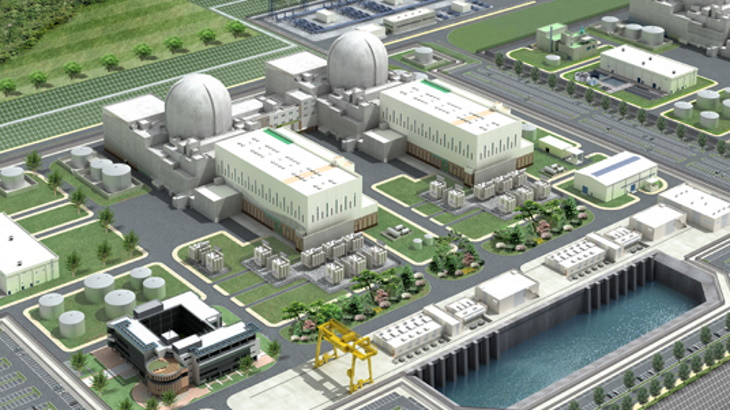
An artistic impression of Shin Hanul 3 and 4 (Image: KHNP)
https://www.world-nuclear-news.org/arti ... 1400-units
- energy_isere
- Modérateur

- Messages : 102799
- Inscription : 24 avr. 2005, 21:26
- Localisation : Les JO de 68, c'était la
- Contact :
Re: Le nucléaire Sud-Coréen
https://www.world-nuclear-news.org/arti ... w-reactorsSouth Korea confirms need for new reactors
Friday, 21 February 2025
Two new large nuclear power reactors and 700 MW of small modular reactor capacity should be built by 2038 - in addition to the large reactors already under construction or planned - under South Korea's latest 15-year long-term energy plan, which has now been finalised.
An artistic impression of Shin Hanul 3 and 4 (Image: KHNP)
The 11th Basic Power Supply and Demand Plan, a draft of which was released in May last year, was presented to a plenary session of the National Assembly by the Ministry of Trade, Industry and Energy on 19 February. It was approved by the National Assembly's Power Policy Review Committee on 21 February.
The Basic Power Supply and Demand Plan contains domestic power generation facility plans for the next 15 years. It is updated by the Ministry of Trade, Industry and Energy every two years. The 11th basic plan includes plans from 2024 to 2038.
According to the latest plan, South Korea's demand for electricity will increase by an annual average 1.8% between 2024 and 2038, to reach 129.3 GW by 2038 - an increase of more than 30% from 2023.
Under the draft plan, the portion of carbon-free energy sources in the country's energy mix will increase from about 40% in 2023 to 70% by 2038. It says nuclear power generation is expected to grow from 180.5 TWh in 2023 to 248.3 TWh in 2038. The portion of nuclear power generation will grow from 30.7% in 2023 to 35.2% in 2038. The country's 26 reactors currently provide about one-third of its electricity.
The ministry noted the plan assumes the "smooth construction and continued operation of the five nuclear power plants already planned": Shin Hanul unit 2 (which entered commercial operation in April 2024), Saeul units 3 and 4, and Shin Hanul units 3 and 4. Together, these units will have a combined generating capacity of 7 GWe.
A further two large nuclear reactors with a combined capacity of 2.8 GWe, as well as 0.7 GWe of small modular reactor (SMR) generating capacity will be needed by 2038 to reach the target nuclear capacity, it said.
"After developing technology to ensure SMR safety, obtaining standard design approval, etc, commercialisation of domestic SMR [is expected] by 2035 on the premise of obtaining a construction permit in the early 2030s," the ministry said.
Former President Yoon Suk-yeol, who took office in May 2020 and was impeached in December last year, vowed to reverse previous President Moon Jae-in's policy of phasing out nuclear power, a policy which was brought in after he assumed office in 2017, and followed the 2011 Fukushima Daiichi accident in Japan.
- energy_isere
- Modérateur

- Messages : 102799
- Inscription : 24 avr. 2005, 21:26
- Localisation : Les JO de 68, c'était la
- Contact :
Re: Le nucléaire Sud-Coréen
https://www.world-nuclear-news.org/arti ... tor-beginsConstruction of new Korean reactor begins
28 May 2025
First safety-related concrete has been poured for the reactor building of unit 3 at the Shin Hanul nuclear power plant in South Korea. The APR1400 unit is scheduled to be completed in 2032.
(Image: KHNP)
Korea Hydro & Nuclear Power (KHNP) announced "the start of full-scale structural work by pouring the first concrete for the reactor building, a key construction process for Shin Hanul unit 3, at the Shin Hanul units 3 and 4 construction site on 20 May".
In November 2014, KHNP signed an agreement with Ulchin County to build Shin Hanul 3 and 4. The company applied for a construction licence for the units in January 2016. Site preparation for the two units was originally scheduled to begin in May 2017, with commercial operation of unit 3 scheduled for December 2022, with unit 4 following a year later.
However, KHNP announced in May 2017 that it had instructed Kepco Engineering & Construction - which signed a design contract in March 2016 - to suspend work for the planned units as a result of the then new President Moon Jae-in's policy of phasing out nuclear power. Work towards licensing the new units continued.
.........................
- energy_isere
- Modérateur

- Messages : 102799
- Inscription : 24 avr. 2005, 21:26
- Localisation : Les JO de 68, c'était la
- Contact :
Re: Le nucléaire Sud-Coréen
https://www.world-nuclear-news.org/arti ... r-approvedDecommissioning of oldest Korean reactor approved
Thursday, 26 June 2025
South Korea's Nuclear Safety and Security Commission has approved the decommissioning of unit 1 at the Kori nuclear power plant near Busan. The unit was permanently shut down in June 2017, becoming the first South Korean reactor to enter decommissioning.
Kori unit 1 (Image: KHNP)
Kori 1 started commercial operation in 1978. Korea Hydro & Nuclear Power (KHNP) announced in August 2015 it had withdrawn its application to extend the unit's operating licence and in June 2016 it applied to decommission the reactor. The permanent shutdown of Kori 1 was approved by the Nuclear Safety and Security Commission a year later. The 576 MWe pressurised water reactor was permanently shut down on 18 June 2017 and KHNP was required to submit a decommissioning plan for the unit within five years of its closure.
KHNP submitted its application to dismantle the unit to the Nuclear Safety and Security Commission (NSSC) in May 2021.
The NSSC has now said it has "reviewed the application documents, including the final decommissioning plan, based on the results of the safety review by the Korea Institute of Nuclear Safety (KINS) and the preliminary review by the Nuclear Safety Expert Committee, and confirmed that the decommissioning of Kori unit 1 satisfied the technical standards according to the Nuclear Safety Act, and approved the decommissioning".
"Considering that Gori unit 1 is the first nuclear power plant decommissioning case in Korea, we conducted a detailed review of all evaluation items," said NSSC Chairman Choi Won-ho. "We will closely inspect the decommissioning process to ensure that the public can feel safe even during decommissioning, and we plan to transparently disclose the inspection results."
KHNP said, following the approval, it will "begin full-scale decommissioning procedures" at the unit. It added that "a new chapter in the history of domestic nuclear power plant decommissioning has opened".
The company said it plans to begin dismantling the facilities in the turbine building sequentially starting next month, and plans to remove the used nuclear fuel from the storage pool to an on-site dry storage facility in 2031, dismantle the radioactive system, and complete dismantling in 2037.
"The decommissioning of Kori unit 1 will be a turning point for internalising domestic decommissioning technology, fostering specialised personnel, and creating an industrial ecosystem beyond the simple demolition of equipment," said KHNP CEO Hwang Joo-ho. "We will transparently disclose the project process to the public and push forward the decommissioning project based on trust with the local community."
In September 2017, the Korea Atomic Energy Research Institute announced it had signed contracts with several domestic companies to develop technologies for decommissioning Kori 1. These included Kepco Plant Service & Engineering and Doosan, among others, to develop technologies for dismantling facilities and equipment, as well as land contamination measurement technology. The companies will also develop technologies for simulating the dismantling of the plant, chemical decontamination and waste disposal processes.
- energy_isere
- Modérateur

- Messages : 102799
- Inscription : 24 avr. 2005, 21:26
- Localisation : Les JO de 68, c'était la
- Contact :
Re: Le nucléaire Sud-Coréen
https://www.msn.com/fr-fr/finance/autre ... 300&ei=105La commission sur la sécurité nucléaire approuve l'exploitation du réacteur Saeul-3
Article de Kim Kun-hee 30 dec 2025 Yonhap
Réacteurs nucléaires Saeul-3 et 4
La Commission sur la sûreté et la sécurité nucléaires (NSSC) a approuvé officiellement l'exploitation du réacteur nucléaire Saeul-3 ce mardi, et son lancement commercial est prévu pour l'année prochaine. Le NSSC a pris la décision après avoir tenu une réunion pour l'approbation du réacteur à la coréenne (APR1400) situé à la centrale nucléaire Saeul à la ville portuaire d'Ulsan, dans le sud-est du pays.
La décision est intervenue environ deux semaines après que la commission a reporté sa décision finale durant sa réunion initiale. Suite à la décision, l'unité, dont la construction a débuté en 2016, fera l'objet d'une exploitation pilote au cours des six prochains mois.
Saeul-3 est le premier réacteur nucléaire sud-coréen conçu pour résister aux attaques aériennes, avec des murs de 137 cm d'épaisseur, soit 15 cm de plus que ceux des réacteurs précédents. Le réacteur a une capacité de stockage de combustible nucléaire usé pouvant aller jusqu'à 60 ans, suffisante pour entreposer l'ensemble du volume généré durant sa durée de vie. L'unité était connue sous le nom de Kori-5 avant d'être rebaptisé en 2022.
